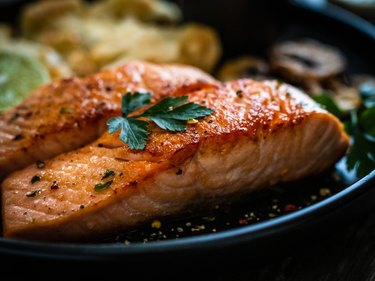
Bulking up is equal parts how many reps you get done in the gym and the nutritional choices you make to refuel your body and your muscles.
"In order to build muscle, you need to strength train (which includes body weight, weights or resistance training exercises)," Mandy Enright, RDN, tells LIVESTRONG.com. "The foods we eat help to promote the growth and recovery of muscles, but they won't immediately cause your muscles to grow."
Video of the Day
Video of the Day
Muscle building requires two things: Amino acids and a stimulus. There are 20 different amino acids that make up protein in your diet. We can make eleven of them on our own, but we have to get nine from our diet, and those are labeled essential amino acids.
These amino acids fuel multiple functions in the body, but one role that gets a lot of attention is muscle building. Not to burst your bubble, but you don't get bigger muscles just by eating protein. Remember that stimulus mentioned above? That's exercise, and you need it to reach those strength goals. And while protein gets a lot of love, it's the whole diet that matters when working to build a stronger physique.
Here are some dietitian-approved foods to help you build muscle that'll make your sweat sessions worth it.
1. Whole Eggs
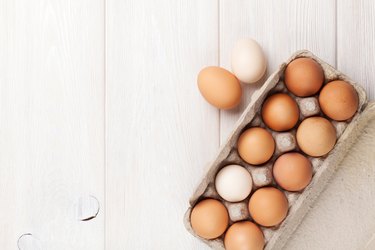
Per one large egg:
- Calories: 70
- Protein: 6 grams
Whole eggs provide a quick, easy source of protein, which is essential for building and repairing muscles post-workout.
Eggs contain leucine, an amino acid in a special category called branched-chain amino acids (BCAAs). Leucine is thought to be the "trigger" for turning on muscle protein synthesis, aka building new muscle. You'll get roughly 0.5 grams of leucine per egg, according to July 2022 research in Nutrients.
So, then it begs the question of how much leucine you need. It seems to differ between younger and older adults, as younger people are more sensitive to the effects of leucine. For younger adults, 2 to 3 grams of leucine per 25 to 30 grams of protein is enough, but older adults may need up to 4 grams of leucine, according to a February 2018 article in the American Journal of Clinical Nutrition.
Eggs are also rich in vitamins, zinc, iron and calcium, making them one of the most quality proteins out there.
2. Chicken Breast
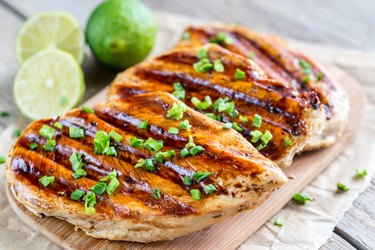
Per 3-ounce serving:
- Calories: 141
- Protein: 26 grams
Lean protein from animal sources may offer you more grams of protein per serving than plant-based protein if you're looking for that. Chicken breast is relatively inexpensive, versatile, easy to cook and can be served in many different styles and as part of various dishes, so it's an all-around win.
Animal proteins, like chicken, are a bit of a no-brainer when it comes to protein: They contain the full set of essential amino acids needed for muscle growth.
3. Whey Protein
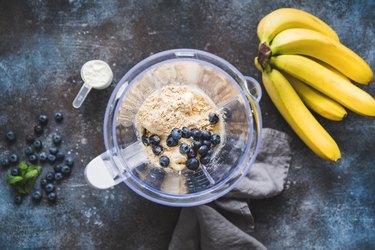
Per scoop:
- Calories: 103
- Protein: 16 grams
Whey is often thought of as the king of protein powders, with numerous numbers of research studies indicating its efficacy in building muscle. Whey protein is a fast-absorbing protein that's best served post-workout because it contains amino acids that are critical to building and maintaining muscle.
"Whey protein can be good for building muscle as whey protein quickly boosts protein synthesis and spikes muscle recovery," Carissa Galloway, RDN, says. You can easily find it just about anywhere and add it to any shaker bottle or smoothie.
4. Potatoes
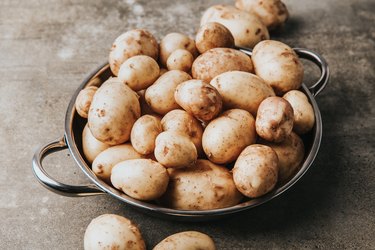
One medium baked potato:
- Calories: 159
- Protein: 3.6 grams
You might be thinking this is a joke, as potatoes are often shunned in the diet world for their starchy nature. But potatoes and potato protein powders are gaining ground in the fitness world — who would've thought?
Potato protein is comparable to brown rice, wheat and pea protein. When taken as a percentage of total protein, potato protein ranks highest among the common plant proteins for essential amino acids, according to August 2018 research in Amino Acids.
Potatoes are short in one amino acid, so their protein quality does not exactly match animal protein. But when added to a diet rich in a variety of foods, your body will piece together the amino acid puzzle for you.
5. Lean Beef
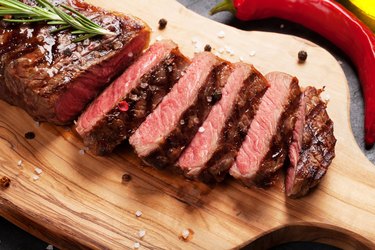
Per 3-ounce serving:
- Calories: 168
- Protein: 26 grams
Lean beef is not only high in protein but also rich in iron, zinc and vitamin B12. Choose leaner cuts of beef to cut down on the amount of saturated fat in your diet.
"Grass-fed beef can be a leaner source of meat and contains some nutritional benefits like higher content of omega-3s, antioxidants, and vitamins A and E. It can also be lower in calories," Enright adds.
6. Turkey
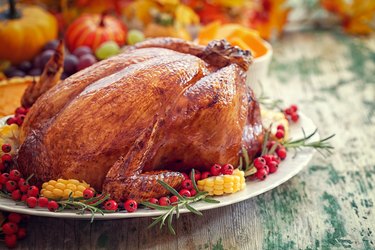
Per 3-ounce serving:
- Calories: 125
- Protein: 25.6 grams
Turkey isn't just for Thanksgiving. It happens to be one of the most under-appreciated muscle-building foods. According to a June 2015 study in Food and Nutrition Research, white poultry meat is a fantastic source of protein, a good source of energy-producing B vitamins and it's also associated with a lower risk of heart disease.
When choosing your turkey, go easy on the skin and stick with the meat. The calorie-to-protein ratio in turkey breast is great for a muscle-building diet.
7. Quinoa
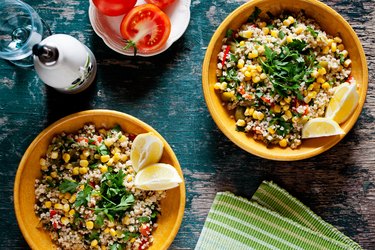
Per 1/2 cup cooked serving:
- Calories: 111
- Protein: 4 grams
Look no further if you want a solid plant-based protein source that helps build muscle. "Quinoa is one of the only plant foods that provide all nine essential amino acids — this means that our bodies need to consume these proteins because we cannot make the amino acids ourselves," Galloway says.
One 3.5-ounce serving of quinoa provides over 4 grams of protein. "It is also high in magnesium and iron, which help promote protein synthesis," Galloway adds.
8. Pea Protein Powder
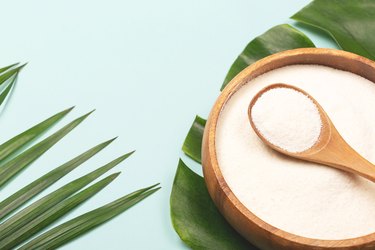
Per one scoop:
- Calories: 90
- Protein: 15 grams
You might see pea protein popping up everywhere in vegan protein powders and even in your favorite bagged snacks. It's not just trendy — it's actually a rich source of protein.
Pea protein powder is isolated from real peas and has an impressive amount of protein per calorie amount. Peas are low in the amino acid methionine and have leucine content comparable to brown rice and soy proteins, according to the August 2018 Amino Acids study.
Pea protein can easily be mixed up in your shaker bottle or added to a smoothie or baked goods for a protein (and fiber) boost.
9. Chickpeas
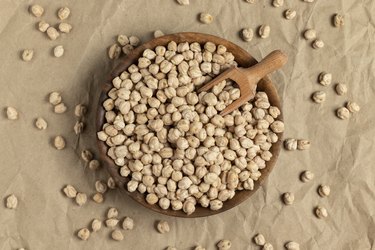
Per 1/2-cup serving:
- Calories: 135
- Protein: 7.3 grams
Chickpeas made the list of muscle-building foods, not only for their stellar protein amount but also for their versatility.
Chickpeas are a source of folate, calcium, magnesium and potassium, according to November 2016 research in Nutrients. This study also shows that low calcium and magnesium may interfere with skeletal muscle function and may have an effect on the ability to engage in exercise.
10. Spinach
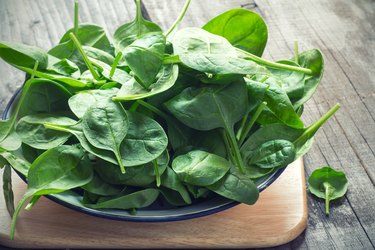
Per 3 cups of raw spinach:
- Calories: 21
- Protein: 2.6 grams
There might've been a reason why Popeye ate so much spinach. "Spinach has been found to contain a phytosteroid called ecdysteroids, which can increase the creation of protein and muscle in the body," Enright says.
"Spinach also contains nitrates, which, in small doses, have been found to be beneficial to the body," Enright says. "The nitrates found in spinach stimulate two proteins in the body that help release calcium. When these proteins in the body increase, more calcium is released, which helps with muscle contraction and ultimately more strength and toning for the muscle."
But don't stop doing your push-ups just yet — you'd have to eat over 2 pounds of spinach a day to build up those muscles just from spinach, Enright adds. And while you're unlikely to eat that much, it shouldn't stop you from using it in salads, smoothies, stir-fries and more.
11. Sweet Potato
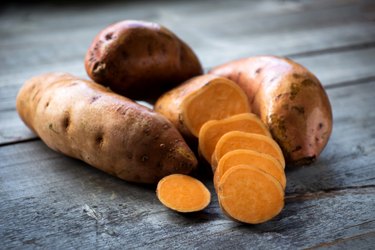
Per medium sweet potato:
- Calories: 112
- Protein: 2 grams
Carbohydrates are an essential nutrient for your body, and sweet potatoes are one of the tastier and more convenient options to replenish energy stores and fuel the muscle-building process. They won't necessarily help you build muscle directly because they don't contain much protein, but the energy you get from sweet potatoes prior to a workout can help you train with more intensity, Enright explains.
"Sweet potatoes are also high in fiber, making them a great food to slow absorption of sugars from food, curb hunger and promote the use of fat for energy. It's best to eat sweet potatoes after a workout to refuel," Enright says.
12. Wild Salmon
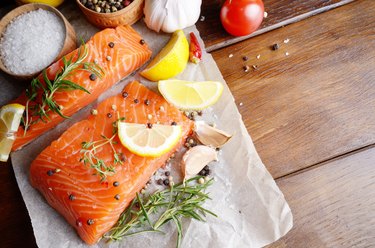
Per 3-ounce serving:
- Calories: 118
- Protein: 20 grams
"Any type of seafood is great for building muscle. Seafood is a lean source of protein that contains omega-3s, which are great for helping to promote the building and growth of muscles," Enright says. The research agrees: Omega-3s were shown to increase muscle protein synthesis in older adults in a small April 2017 study in Aging.
Omega-3 fatty acids may also help decrease post-exercise muscle soreness, according to a small July 2017 study in the Journal of the International Society of Sports Nutrition.
13. Soy Milk
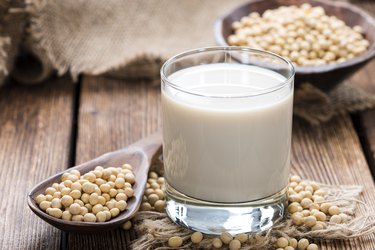
Per cup serving:
- Calories: 80
- Protein: 7 grams
Soy has definitely had its share of controversy, but when it comes to the protein in soy, there is no question that it's good for you. When matched against whey protein, soy protein was found to produce similar gains in strength, according to a November 2018 meta-analysis in the International Journal of Sports Nutrition and Exercise Metabolism.
Many studies used soy protein powder, but you can get the same protein benefits from whole-food soy products, like soy milk.
14. Cottage Cheese
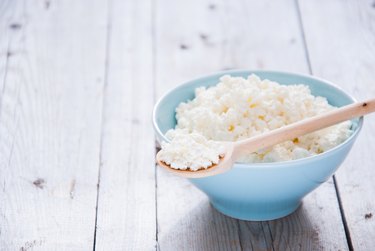
Per 1/2-cup serving:
- Calories: 81
- Protein: 11.7 grams
You may not think to load up on cottage cheese after a workout, but it's one of the best muscle-building foods you'll find.
"The protein found in dairy (including milk, cottage cheese, yogurt and all cheeses) is high-quality protein. Not only does it contain all essential amino acids that the body needs, but it also contains calcium, which helps increase muscle contraction and strengthen the muscles," Enright says.
15. Chocolate Milk
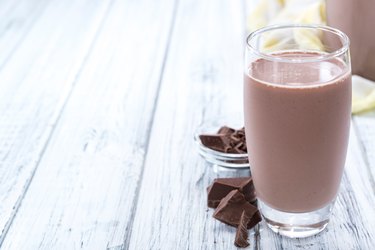
Per cup serving:
- Calories: 190
- Protein: 7.5 grams
It seems too good to be true, but chocolate milk can actually help you build more muscle. In fact, chocolate milk was shown to be more effective than sports drinks or water in exercise recovery, per a June 2019 study in the European Journal of Clinical Nutrition. Another February 2019 study in the European Journal of Sport Science showed that cow's milk can help with rehydration, muscle protein synthesis and managing muscle soreness.
And it's dietitian-recommended, too: "I encourage more of my clients to consume a glass of low-fat or nonfat chocolate milk, which has been found to contain the perfect ratio of carbs to protein after a workout. Not to mention, the cost is significantly lower than protein powder," Enright says.
16. Greek Yogurt
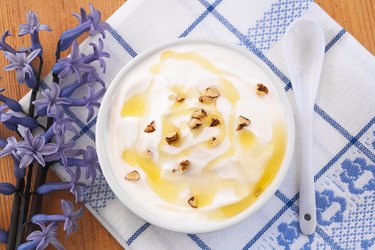
Per cup serving:
- Calories: 166
- Protein: 22.6 grams
Greek yogurt is another powerhouse muscle-building food that you can eat at any time of the day. When looking for a yogurt that will support your muscle-building goals, look for one with over 10 grams of protein and minimal — less than 4 grams — added sugar. Don't look at total sugars as yogurt contains the naturally occurring milk sugar called lactose.
Eating dairy may be a dietary restriction for some people, so if you choose a plant-based alternative, it's important to find one with as much protein as possible. Read those labels to find the right yogurt for your needs.
17. Lentils
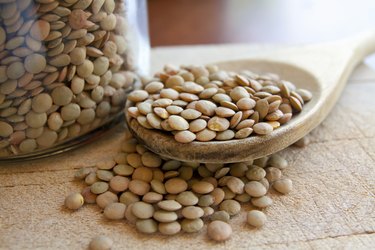
Per 1/2 cup cooked lentils:
- Calories: 115
- Protein: 9 grams
Who says you need to eat meat to fill up on protein? Lentils are a vegan-friendly food that offers the protein your muscles need, without the high-impact carbohydrate rush that affects your insulin levels. "They are also a great source of fiber, which will help to keep you full and provide you with a source of energy," Galloway says.
Plus, they offer B vitamins and magnesium, which are crucial to having enough energy for your next workout, per an October 2015 study in Clinical Diabetes.
18. Almonds
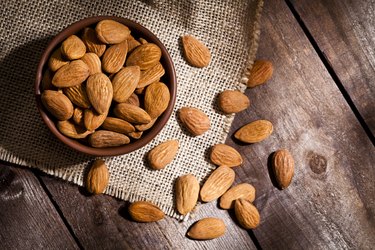
Per 1-ounce serving (23 almonds):
- Calories: 164
- Protein: 6 grams
Big things can come in small packages. Almonds provide an amazing source of protein and fat, but it's their vitamin E that's most beneficial to your muscles.
"While almonds are traditionally considered a source of healthy fats, they do contain 6 grams of protein per serving. They also contain an incredible amount of vitamin E that helps prevent oxidative damage in the muscles," Galloway says.
19. Pineapple
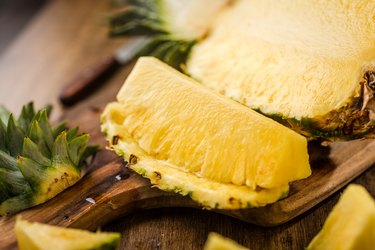
Per 1-cup serving:
- Calories: 83
- Protein: 1 gram
Fruit might not be the first thing you think of when you think of building muscle, but pineapple should definitely be included. "Not only is pineapple delicious, but even more importantly, it contains bromelain, which helps fight muscle soreness and helps your body absorb protein," Galloway says. "The more protein absorbed by your body, the more your muscles can grow."
In addition to reducing muscle inflammation, a September 2016 study in Biomedical Reports states that bromelain can also help with blood circulation and wound healing, making it a great addition to your post-workout meal.
20. Steel-Cut Oats
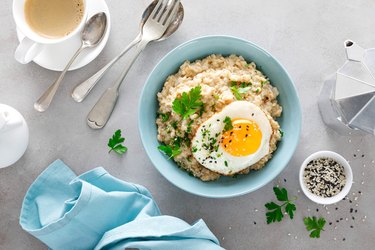
Per 1/4 cup of uncooked oats:
- Calories: 150
- Protein: 5 grams
Oatmeal is a nutritious, filling grain, and the steel-cut variety adds more benefits to the mix. The body digests steel-cut oats slowly, meaning you stay fuller for longer and maintain consistent blood sugar levels. They are also a source of prebiotic fiber that will help feed the good bacteria in your gut.
"Steel-cut oats are a source of carbohydrates and fiber, making them a great food to help with muscle recovery after a workout. It's best to consume steel-cut oats after a workout to help repair muscles and promote healthy muscle growth," Enright says.
- Food Nutrition Research: "Role Of Poultry Meat in a Balanced Diet Aimed at Maintaining Health and Wellbeing: an Italian Consensus Document"
- Biomedical Reports: "Potential Role of Bromelain in Clinical and Therapeutic Applications"
- European Journal of Clinical Nutrition: "Chocolate Milk for Recovery From Exercise: a Systematic Review and Meta-analysis of Controlled Clinical Trials"
- European Journal of Sport Science: "Cow's Milk as a Post-exercise Recovery Drink: Implications for Performance and Health"
- Clinical Diabetes: "Legumes: Health Benefits and Culinary Approaches to Increase Intake"
- Nutrients: "The Health Benefits of Egg Protein"
- American Journal of Clinical Nutrition: "Is Leucine Content in Dietary Protein the Key to Muscle Preservation in Older Women?"
- International Journal of Sport Nutrition and Exercise Metabolism: "No Difference Between the Effects of Supplementing With Soy Protein Versus Animal Protein on Gains in Muscle Mass and Strength in Response to Resistance Exercise"
- Aging: "Influence of Omega-3 Fatty Acids on Skeletal Muscle Protein Metabolism and Mitochondrial Bioenergetics in Older Adults"
- Journal of the International Society of Sports Nutrition: "Effect of Eicosapentaenoic Acids-rich Fish Oil Supplementation on Motor Nerve Function After Eccentric Contractions"
- Nutrients: "The Nutritional Value and Health Benefits of Chickpeas and Hummus"